 W
WAcleris hyemana is a moth of the family Tortricidae. It is found in Europe.
 W
WAcrobasis marmorea is a moth of the family Pyralidae. It is found in Europe.
 W
WAethes margaritana, the silver coast conch, is a moth of the family Tortricidae. It was described by Adrian Hardy Haworth in 1811. It is found in most of Europe. The habitat consists of downland, waste ground and shingle beaches.
 W
WAgonopterix curvipunctosa is a moth of the family Depressariidae. It is found in most of Europe, except Ireland, Portugal, Finland, the Baltic region and the western and southern part of the Balkan Peninsula.
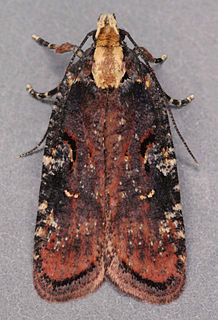 W
WAgonopterix liturosa is a moth of the family Depressariidae. It is found in most of Europe. It is also found in the Near East and the eastern part of the Palearctic realm.
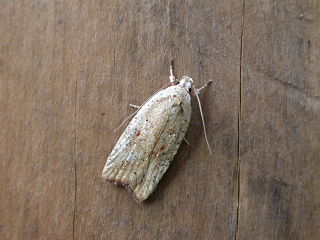 W
WThe gorse tip moth is a smallish moth species of the family Depressariidae.
 W
WAgonopterix purpurea is a moth of the family Depressariidae. It is found in most of Europe.
 W
WAgriphila geniculea, the elbow-striped grass-veneer, is a species of moth of the family Crambidae. It was first described by Adrian Hardy Haworth in 1811.
 W
WAgriphila latistria is a species of moth of the family Crambidae. It is found in Europe, but originates from the area surrounding the Mediterranean Sea.
 W
WAmblyptilia punctidactyla, also known as the brindle plume, is a moth of the family Pterophoridae found in Asia and Europe. The species was first described by the English entomologist, Adrian Hardy Haworth in 1811.
 W
WAnania lancealis is a species of moth of the family Crambidae described by Michael Denis and Ignaz Schiffermüller in 1775.
 W
WAncylis diminutana, the small festooned roller, is a moth of the family Tortricidae. It was described by Adrian Hardy Haworth in 1811. In Europe, it has been recorded from Great Britain, the Benelux, Scandinavia, the Baltic region, Russia, Poland, the Czech Republic, Hungary, Romania, Slovenia and Switzerland. It is also found in North America.
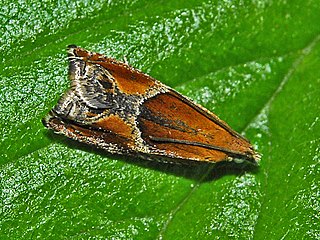 W
WAncylis obtusana, the small buckthorn roller, is a moth of the family Tortricidae.
 W
WApotomis semifasciana, the short-barred grey marble, is a moth of the family Tortricidae. It was first described by the English entomologist Adrian Hardy Haworth in 1811.
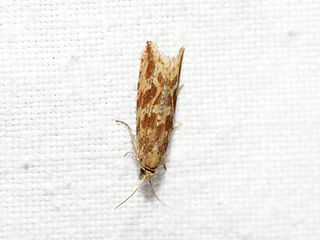 W
WBactra furfurana, the mottled marble, is a moth of the family Tortricidae described by Adrian Hardy Haworth in 1811. It is found in the Nearctic and Palearctic realms.
 W
WCnephasia longana, the omnivorous leaftier moth, long-winged shade or strawberry fruitworm, is a moth of the family Tortricidae. It was described by Adrian Hardy Haworth in 1811. It is native to western Europe. It is an introduced species in western North America. The species has also been reported from north-western Africa and Asia. The habitat consists of downland and rough ground.
 W
WCochylidia subroseana, the dingy roseate conch, is a moth of the family Tortricidae. It was described by Adrian Hardy Haworth in 1811. It is found from most of Europe to China, Russia, Korea and Japan. It has also been recorded from North America.
 W
WCochylimorpha straminea, the straw conch, is a species of moth of the family Tortricidae. It is found in most of Europe, Morocco, Algeria, Tunisia, Asia Minor, the Palestinian territories, Iraq, Syria, Armenia, Transcaspia, Turkmenistan and Iran.
 W
WCochylis nana is a moth of the family Tortricidae. It was described by Adrian Hardy Haworth in 1811. It is found in Europe, Amur Oblast of Russia and Nova Scotia in Canada.
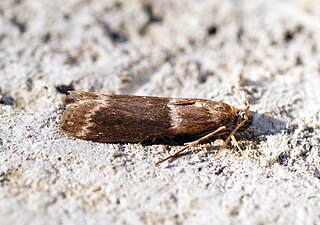 W
WCryptoblabes bistriga is a species of snout moth in the genus Cryptoblabes. It was described by Adrian Hardy Haworth in 1811. It is found in most of Europe, except Portugal, parts of the Balkan Peninsula and Ukraine.
 W
WCydia ulicetana is a moth of the family Tortricidae. It is native to western Europe, but was introduced to Hawaii.
 W
WEndothenia marginana, the downland marble, is a moth of the family Tortricidae. It was described by Adrian Hardy Haworth in 1811. It is found in almost all of Europe.
 W
WEndothenia nigricostana, the black-edged marble, is a moth of the family Tortricidae. It was described by Adrian Hardy Haworth in 1811. It is found from most of Europe, east to Japan. The habitat consists of woodland margins and embankments.
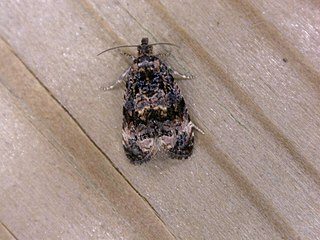 W
WEndothenia oblongana is a moth of the family Tortricidae. It is found in the Palearctic realm.
 W
WEndothenia pullana, the woundwort marble, is a moth of the family Tortricidae. It was described by Adrian Hardy Haworth in 1811. It is found in north-western Europe, Sweden, Finland, Austria, Slovakia, Ukraine, Belarus and Russia. The habitat consists of marshy areas.
 W
WEpinotia tetraquetrana, the square-barred bell, is a moth of the family Tortricidae. It is found from most of Europe east to the Near East and the eastern part of the Palearctic realm.
 W
WEuchromius ocellea, the necklace veneer, is a moth of the family Crambidae described by Adrian Hardy Haworth in 1811. It is a widespread species, found in tropical and subtropical regions, but migrates to Europe.
 W
WEucosma cana, the hoary bell, is a species of moth of the family Tortricidae.
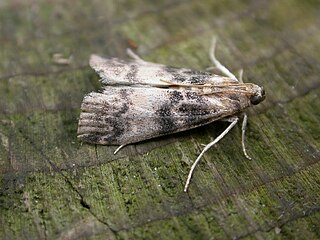 W
WEuzophera pinguis, the tabby knot-horn, is a moth of the family Pyralidae. It was described by Adrian Hardy Haworth in 1811 and is found in Europe.
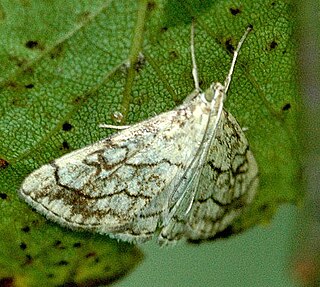 W
WEvergestis pallidata is a species of moth of the family Crambidae described by Johann Siegfried Hufnagel in 1811. It is found in Europe, North America and northern Asia.
 W
WFalseuncaria ruficiliana, the red-fringed conch, is a species of moth of the family Tortricidae. It is found in China (Xinjiang) and most of Europe. The habitat consists of limestone, heathland and moorland.
 W
WGillmeria pallidactyla is a moth of the family Pterophoridae first first described by the English entomologist, Adrian Hardy Haworth in 1811. It has a Holarctic distribution and is widespread throughout North America and Eurasia.
 W
WGypsonoma sociana is a moth of the family Tortricidae. It is found from Europe to Russia, China and Japan.
 W
WHedya nubiferana, the marbled orchard tortrix or green budworm moth, is a moth of the family Tortricidae. It is found in the Palearctic and Nearctic realms.
 W
WHysterophora maculosana, the bluebell conch, is a species of moth of the family Tortricidae. It is found from most of Europe, east to the Crimea, Asia Minor and the Palestinian territories. The habitat consists of woodland areas.
 W
WIsotrias rectifasciana, the hedge shade, is a species of moth of the family Tortricidae found in Asia and Europe. The moth was first described by the English entomologist, Adrian Hardy Haworth in 1811.
 W
WMarasmarcha lunaedactyla, also known as the crescent plume is a moth of the family Pterophoridae found in most of Europe. It was first described by Adrian Hardy Haworth in 1811.
 W
WOxyptilus parvidactyla, also known as the small plume, is a moth of the family Pterophoridae found in Africa, Asia and Europe. It was first described by Adrian Hardy Haworth in 1811.
 W
WPhtheochroa implicata, the plain conch, is a species of moth of the family Tortricidae. It is found in China, Iran, Japan, Mongolia, Russia and most of Europe. It has also been recorded from North America. The habitat consists of damp areas and woodland edges.
 W
WPhtheochroa sodaliana, the buckthorn conch, is a species of moth of the family Tortricidae. It is found in most of Europe and in Russia (Uralsk) and Lebanon. The habitat consists of dry pastures, heathland and fens.
 W
WPyla fusca is a snout moth of the subfamily Phycitinae and inhabits the Holarctic. It is distinct from the other species of the genus Pyla, which are only found in North America, and has been proposed for separation in a monotypic genus Matilella. Considering the insufficient knowledge of Phycitinae, this may be warranted, and eventually relatives of this specimens might be discovered in the Old World, or it might turn out to be a cryptic species complex. On the other hand, its separation might render Pyla paraphyletic, in which case it would not be warranted. More research is required to resolve this question.
 W
WRhodophaea formosa is a moth of the family Pyralidae. It is found in most of Europe.
 W
WScoparia subfusca is a species of moth of the family Crambidae. It is found in Europe.